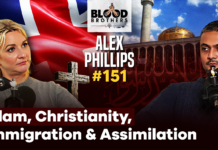Numerous mosque councils from the north of England have issued a joint statement criticising state intervention in madrassas.
Below is the statement written by the Northern Council of Mosques in response to the UK Government’s consultation over the registration and monitoring of “out-of-school settings”.
The statement has been sent to politicians, academics and the mainstream media to demonstrate the opposition to such measures.
“In view of the opinions expressed by senior political figures in recent months, it sadly appears to many that the Government is determined to see through the regulation of the education in out-of-school settings despite there being an overwhelming rejection of it. The Government is driven to regulate out-of-school settings under a misguided belief that regulation is required because there exists compelling and quality evidence that justifies religious education out-of-school settings are engaging in ‘’prohibited activities’’ that is ‘’undesirable teaching, for example teaching which undermines or is incompatible with fundamental British values, or which promotes extremist views’’.
“We believe that there is no compelling necessity for regulating a community education sector that has served and flourished independently. It allows communities to take responsibility for addressing special and additional educational needs not adequately catered for or provided by the state education system. It would be irresponsible on the part of the government to dampen/ destroy the community spirit, action and ownership that has served us well.
“If areas of improvement are needed for religious education in out-of-school settings, we believe that the state regulation is a massive over reaction. Rather the communities themselves are in the best position to address any potential concerns in partnership with other local stakeholders.
“Observations, concerns and recommendations:
Subscribe to our newsletter and stay updated on the latest news and updates from around the Muslim world!
“It is our collective duty to ‘represent’ the concerns of and recommendations from our members from the Islamic religious education sector. Thus, we take this opportunity to make a number of observations, concerns and recommendations with respect to the proposed Government regulation of religious education in out-of-school settings.
- We strongly hold onto the view that Mosques/Madrassas and other faith providers including Churches/Sunday Schools and Synagogues/Yeshivas should remain independent to practise and educate within their respective faith without undue Government interference.
- Further, religious education in out-of-school settings have been established with ‘’the paramount interest’’ and wellbeing of children in mind, to learn in a safe environment. The proposals contained in the consultation document clearly breach the independency of faith providers.
- The proposal of ‘registration’, ‘inspection’ and ‘sanctions’ as set out in the consultation document clearly departs from the British tradition not to regulate religious education and worship in the following three ways:
- a) Firstly, any providers of religious education in out-of-school settings would be required by ‘compulsion’ to ‘register with the Government via the LA and/or Ofsted.
- b) Secondly, once registered the religious education provider would be subject to a Government inspection regime via LA and/or Ofsted. We note that the inspection regime as with state schools, would inspect the content of religious curriculum and its religious teaching against criteria set by Government and further interpreted by Government inspectors from LA and/or Ofsted.
- c) Thirdly, should the provider of a religious education in out-of-school setting not meet the Government’s criteria with respect to its religious education, then the Government would have the sanction powers to remove teachers and/ close the religious education out-of-school provision on principle grounds of ‘extremism’.
“We believe the definition of ‘’extremism’’ which lies at the heart of the regulation of religious education in out-of-school settings is open to abuse due to its vague definition. It allows subjective interpretations by Government via LA and/or Ofsted, who will be making decisions over the registration process or inspection or sanctioning for non-compliance of religious education in out-of-school settings. The term ‘extremism’ is potentially all encompassing, vague and lacks any legal certainty. We note the term ‘extremism’ is a much contested concept even within Parliamentary reports which offered conflicting findings often sensationalised by the media and overstated by some officials over whether ‘extremist’ practices were in fact found in Birmingham Schools. ‘Extremism’ was also a term the Home Secretary, Theresa May, was unable to define when questioned on Radio 4 “Today’s Programme” [13th May 2015].
- In addition to the above, we are concerned that orthodox religious ideas and practices will fall foul of any criteria set by Government on how religious education should be taught. For example, religious concepts related to belief, sacrifice or religious bonds of unity as well as religious practices such as modesty in dress, gender relationships, marriage, inheritance, will writing and the resolution of family disputes are likely to fail any educational criteria set by the Government. That is because it is apparent that the Government has adopted an “aggressive secular” interpretation of the vaguely defined term “British values” and the equally vague benchmark which is found in Government reports that some ‘failing schools’ ‘do not prepare children for modern British life.’
- We further believe there is little, if any evidence, to support the claim that religious education in out-of-school settings promotes terrorism, or its religious teachings are a pathway to terrorism, or that children are vulnerable to terrorism by attending such provisions. Therefore, there is no compelling evidential justification for Government regulation via local authority and/or Ofsted of ‘religious education’ provided in an out-of-school setting.
- Unfortunately we fear that should out of school settings be regulated this will adversely affect children’s development should these proposals pass into law. This is due to the idea of Prevent agenda and the S.21 Prevent Duty to prevent individuals being drawn into terrorism being tied into the regulation process:
- a) There is growing evidence in other educational settings that the application of ‘S.21 Prevent Duty’ within nurseries, schools, colleges and universities has been misapplied due to the vague nature of terms like extremism and the flawed theory of radicalisation. For example there are reports of children who have been referred to Prevent Boards for wanting to pray in school or being critical of the media or foreign policy or officials saying that a change in dress, not shopping at a particular store and not participating in another faith’s celebrations are signs of ‘extremism’.
- b) Children need safe space to discuss their views on current events and properly directed by true religious teachings without fear of being referred to a Prevent Board. This would be difficult to achieve within the context of the vague definitions of ‘extremism’ and the risk-averse culture which seems to develop in other educational settings. Faith providers may simply avoid such open conversations with children for fear of being labelled extremists themselves.
- c) We believe it is unhealthy for children and their development to have such intrusive and excessive amount of Government monitoring of their ordinary daily activities.
- We have reason to believe that the proposition to register out-of-school settings is designed to disproportionately target the Muslim community due to the non-evidential basis of associating Madrassas with radicalisation. Similarly we have seen how the Prevent strategy has been selectively applied upon Muslims based upon a preconceived prejudice that is built around vague notions of extremism and radicalisation. For example a FOI request revealed that between 2007-10, 67% of referrals to the Channel program were Muslim and from 2012-13, 57% were Muslim, bearing in mind that Muslims make up less than 5% of the UK population.
- Furthermore, where there are issues of concerns over religious education in out-of-school settings, we believe such concerns are best addressed by an independent advisory/standard bodies rather than to put in place far reaching powers to regulate all religious education in out-of-school settings through the process of compulsory registrations, inspection and sanction departing from principles and traditions outlined above.
- We believe the process of registering and preparation for inspections for many religious education in out-of-school settings will be an inefficient use of time, resources and money, particularly at a time of austerity.
- We further believe there are ample laws and safeguarding measures to close premises on grounds of health and safety or fire safety concerns or planning violations and also to prosecute those who harm children via the criminal and civil justice system and prohibit them from teaching with children again. Where there are gaps in the law on unsafe premises to teach, then Government should consider further legal measures to either prohibit teaching in those premises or closure. However, for the sake of completeness and clarity we do not support the sanctions as set out in para 3.21 of the consultation document to remove teachers or close premises if they are undertaken on grounds of ‘extremism’ for reasons set out above.
- The Government should further recognise the lengths taken by regional independent advisory bodies which assist religious education in out-of-school settings in putting into place effective safeguarding measures, provide teacher training and developing curriculum to achieve high standards for its children.
- Finally our sincere advice to the Government is that, should religious education in out-of-school settings be subject to legal regulation backed by sanction, then it is respectfully submitted this will not be effective to reduce violence or prevent terrorism which we all desire. Moreover, regulation of the kind suggested and further practiced is likely to be counter-productive to developing strong relations between local and central government with the communities they serve and will further alienate some of our communities by undermining the trust and confidence that they should have towards Government, Ofsted and their local authority. Many will see regulation of religious education as yet another discriminatory witch-hunt or as a poor attempt by Government to engineer a compliant form of religious devotion and a passive citizenry with anyone critical of official policy perceived as an ‘extremist’.
“We welcome the opportunity to discuss the issues raised in this joint statement further, should you wish to have meaningful consultation and dialogue.”
The statement above was signed by:
- Bolton Council of Mosques
- Council for Mosques, Bradford
- Oldham Mosques
- Lancashire Council of Mosques
- Manchester Council of Mosques
- Stockport Mosques
- Rochdale Council of Mosque




















